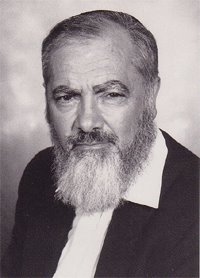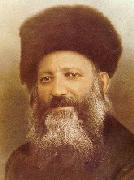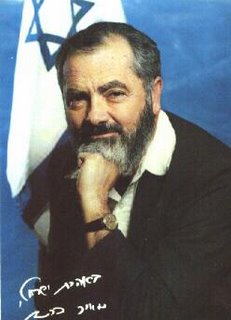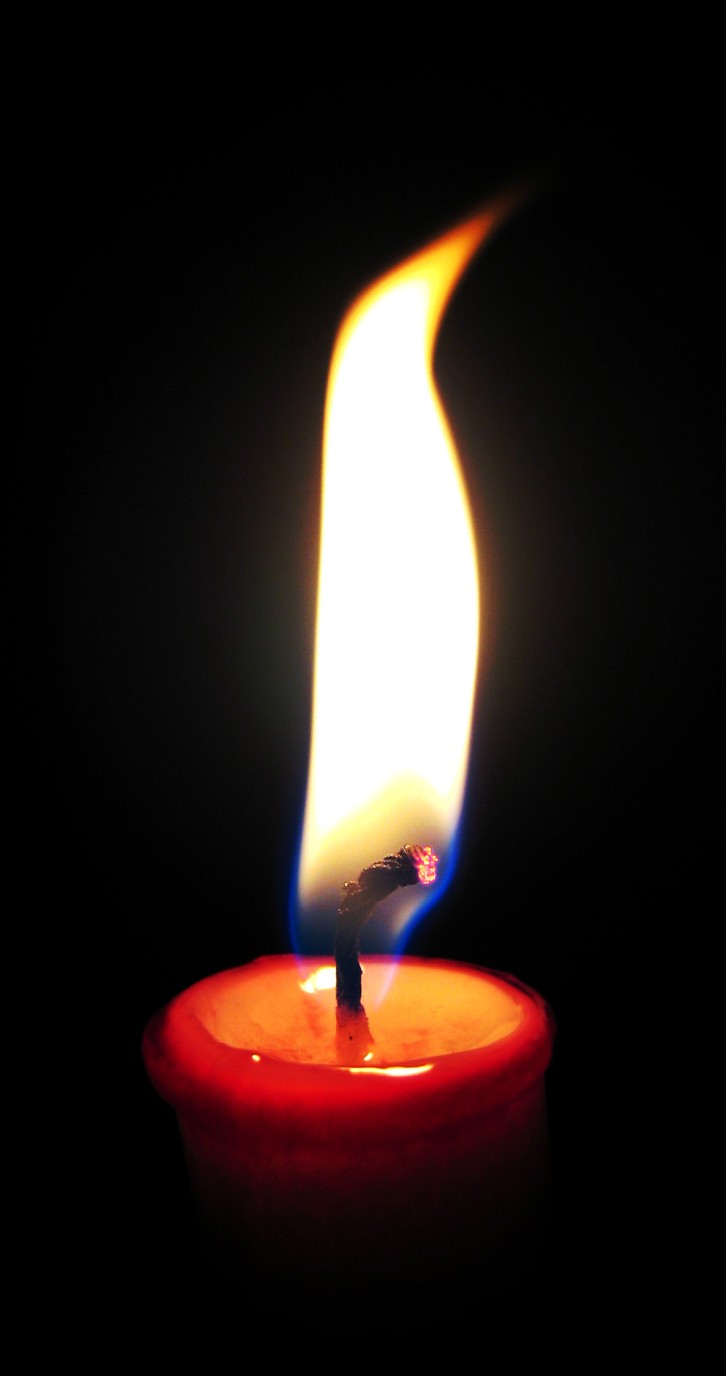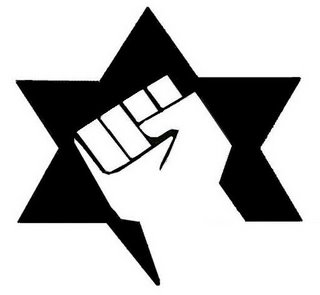
Yesterday
Asher Weisgan was convicted of "murdering" 4 Arab workers in an attack near the Jewish community of Shilo last year in an attempt to thwart Ariel Sharon's expulsion program.
Haaretz,
JPost and others all described a "terrorist" and a "murderer" who killed "in cold blood." I beg to differ, and I think that any normal, level-headed Jew should as well.
There is an enemy living among us in our Holy Land - an enemy who's men, women and children all play their own part in an Islamic holy war against our people. They blow up our buses, cafes, restaurants, and shopping malls; they murder our men, women and children; they make orphans out of our children and cripples out of many of our brothers and sisters. They defile our places of worship and rape our women. They blow up and shoot and stab and lynch any Jew they can get their hands on.
And those who do not hold knives, pistols, rifles and grenades or wear suicide belts,
do throw stones and molotov cocktails,
do lynch our brothers and sisters with their bare hands,
do rape our women,
do physically assault any Jew they can get their hand on who dares venture into "their" towns and villages, even "inside green-line Israel" - and that's only when they decide not to kill them... Others
provide the money, guns, drugs and information; still others produce and distribute the propaganda and inciteful material that is the fuel for their "jihad." Others still need only a can of spraypaint to paint swastikas on our synagogues and schools, and only a couple of bricks or rocks to shatter a few "Jewish" windows.
Others provide intelligence to the terror organisations - even "good" Beduin Arabs, who we hear so often about how they serve in the IDF and so therefore must be "good" Arabs. Yet they sell information on IDF positions to the Hizbullah at the blink of an eye - if often (but not always) in exchange for drugs and money. Other "good" Arab officers have in the past sold guns to the terrorists in Judea, Samaria and Gaza.
And there have been many "Israeli-Arabs" who have provided information and intelligence on potential targets to Hamas, the Al Aqsa Brigades and Islamic Jihad - including plots to poison the Israeli water supply, murder the Sephardi Gadol Rav Ovadia Yoseph shlita, and blow up the Azrieli Towers in Tel Aviv (and that's just off the top of my head).
And then there are those who
rejoice at the deaths of our people. The ones who we have all seen handing out sweets and chocolate as soon as there is news of another successful murder of a Jew. A few of the scenes from the "Palestinian areas" after 9/11 may have gotten some limited publicity, but these things happen every time there is an attack on Jews - especially in Israel.
And what about the "Israeli-Arabs" of the northern communities? The "Israeli citizens." Surely
they are good Israelis, right?! Wrong. During the last war, when almost 200 Israelis lost their lives and hundreds more were injured, and hundreds - even thousands more lost their homes; guess who partied on the rooftops of the "Eastern" side of Jerusalem, as well as certain other towns and cities such as Um El Fahem? Guess who (even after suffering causalties from the Hizbullah rockets themselves) called for the death of the Jewish state and the victory of Hizbullah from the towns and villages of the Galillee. I'll give you a clue: it wasn't the Jews and it wasn't even the "Palestinian Arabs" (they partied in Ramallah, Jenin and Gaza...). It was the "Israeli-Arabs."
Are any of these people "innocents"?
And when the "Palestinian" Arabs voted in Hamas
democratically (with the rest voting for the other terror organisation founded by Yasser Arafat: Fatah), they themselves announced not just to us but to the entire world who they support and what they believe.
If the Israeli judges and politicians and other officials believe so firmly that the general Arab populace are good, innocent people, then let them live among them in Um El Fahem and Shfaraam. Let them try to collect taxes (for the first time in how long...?) from the Arab villages all over the country who have made it quite clear what will happen to anyone stupid enough to dare such a thing (and who as a result do not pay taxes). Why don't they do this? Why do they not walk the streets of the "Arab" areas without a security entourage, and without hiding their Jewishness? I think we all know the answer to that question... They wouldn't last half an hour.
And what happens every time there is a terror attack. Every time another family or families (G-D forbid) have to mourn their son, daughter, mother, father, uncle, aunt, cousin, or friend? Every time another family has to sit shiva for someone. What happens? Not very much. If anyone is arrested they are sent to jail for one, two three or a hundred "life sentences" in Israeli jails where they are free to read, learn for university degrees, watch TV and even continue to learn and practice their religion of hatred. Often it is found that certain terrorists are conducting operations from within these jails, and after every terror attack that they hear about on TV they cheer and shout and celebrate.
That is justice? That is detterant? That is Torah?!
Of course it is none of the above. The Arab still gets to see
his/her family, is still able to walk and function normally - unlike his/her victims, and even sometimes to continue to solicite the murders and maiming of more Jewish men, women and children.
And do you think that such insanity, such mercy of fools, deters others from following in their footsteps? The facts speak for themselves. There are thousands of Arabs in Israeli jails for such crimes, and thousands more who have been in and are now out - and is there any less of a willingness to kill Jews as a result? Of course not! They know that the worst that will happen is that they may be arrested, or, if they are really big "players" in the terrorist world, they will be carefully assassinated - but making sure that as few other people as possible get hurt in the process. As a result, and since they know that if they surround themselves with women and children, or hide in schools and hospitals, Israel will probably leave them alone, many assissination attempts fail (due to the over-emphasis on not causing civilian casualties). And even when they do succeed, there are plenty of others willing to take their place.
They think that Jewish blood is cheap, and that if they kill or maim or kidnap a Jew, the response will be minimal.
But ask yourself, what if every time there was a bus bomb, or a shooting, or a stabbing or a rocket attack - every time a Jew is G-D forbid killed or hurt - there was a revenge attack? If for every one Jew killed there would be ten dead Arabs? And that if they kidnap and abduct our boys, we will do the same to their's? And that every time they desecrate our Holy places, we will do the same to ten of their's?
Why can THEY walk the streets in Israel - in both Jewish and "Arab" places - in safety and security, but we cannot do so
in our own country?When was the last time an Arab was scared to walk down the street in Bnei B'rak, for fear of those "fanatical" Jews? Surely if they cause us to live in fear we should at least make it equal...
Of course, technically one cannot say these things (oops, naughty me), because then you could land in jail for "incitement" (yet when Arab Members of Knesset do the same and even meet with terror chiefs in Syria and Lebanon it is ok of course). But here I am saying it, and it is the truth.
Asher Weisgan, Ami Popper, the "Bat Ayin Cell" - and the many other brave Jews who still languish in the jails of the current oppressive, anti-Torah gov't of Israel are no criminals - they are heroes; among the few who dared raise their hands to do something, to strike back, to - in some small way at least - redeem the rivers of Jewish blood spilled by the Yishmaelite animals. These people are only criminals in the eyes of the Arabs, and in the eyes of those who are too cowardly to admit the truth.
People like them, as well as Eden Natan Zada z"tl h"yd, Dr. Baruch Goldstein z"tl h"yd, and other holy martyrs who even gave their lives for the sake of the G-D of Israel, the Torah of Israel, the People of Israel and the Land of Israel, are demonised and despised by the hellenistic regime and its followers, when in reality all they did was fulfil their obligation under Torah Law of Milchemet Mitzvah.
But the sad truth is that it needn't be. If the words of Rabbi Meir Kahane z"tl h"yd had only been heeded, if only the Arab menace would be transfered from the Land of Israel and the surrounding nations defeated through ferocious power and faith in G-D - then not a single drop of Jewish or Arab drop need spill any more in the Holy Land.
But until then, the politicians will suggest another plan or deal, and another and another, but nothing else will do, because the rockets will still fall (whether from Gaza or Lebanon,) and the guns will still sound, and the suicide bombers will still carry out their murderous assignments.
But whatever happens we should put our faith in G-D that one day soon the world will realise what righteous men these are, and what a holy duty they were a part of, and they will be hailed as heros, not demonised and thrown in jail.
But until then we must remember their names:
Thos who languish in jail for the "crime" of carrying out or attempting to carry out acts of zealotry for the sake of G-D:
Ami Popper, Asher Weisgan, Ofer Gamliel, Shlomo Dvir, Yarden Morag, Yishai Schlissel, and countless more.
And those who were martyred for the sake of G-D, may G-D Avenge their blood:
Dr. Baruch Goldstein, Eden Natan-Zada, Rabbi Nati Ozeri, Rabbi Meir Kahane, Rabbi Binaymin Kahane, Rebbetzin Talya Kahane, all the soldiers and pre-state fighters of Liberation - and all those who I have not mentioned.
May the merit of these people ring loud in the Heavens and shake the Foundations of the Throne of the Almighty G-D, to bring the Final Redemption NOW!









